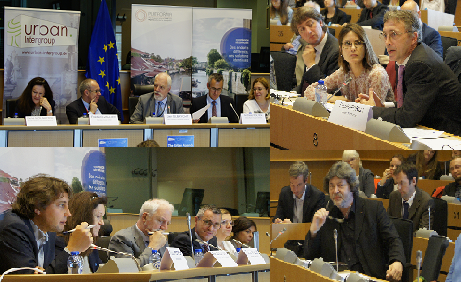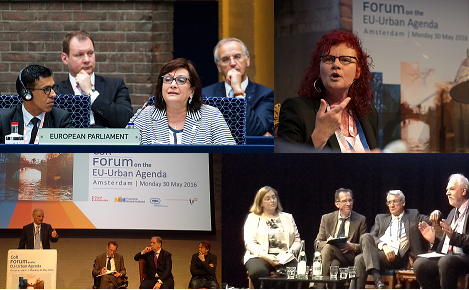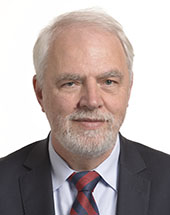HABITAT III – discussion about the role of European local and regional authorities
 Each national delegation has to include a local or regional government representative during Habitat III’s final conference in Quito this autumn. Together, the representatives of the future Slovak presidency, the European Parliament and the Commission have aligned with CEMR and PLATFORMA’s position, presented during the seminar co-organised with the URBAN intergroup on 21 June at the European Parliament.
Each national delegation has to include a local or regional government representative during Habitat III’s final conference in Quito this autumn. Together, the representatives of the future Slovak presidency, the European Parliament and the Commission have aligned with CEMR and PLATFORMA’s position, presented during the seminar co-organised with the URBAN intergroup on 21 June at the European Parliament.
While the seminar was taking place, preparations were already under way for the final conference in Quito (Ecuador), where the new Global Urban Agenda should be adopted. The European Commission representative (DG REGIO) Judit Torokne Rozsa supported the idea of having a local government representative in each national delegation. This idea was strongly endorsed by the Member of the European Parliament (MEP) and President of the URBAN intergroup Jan Olbrycht, who stated:”Let’s fight together for a greater role for local governments.” “We do not want one level to decide for everyone. Local and regional governments have to show the way”, confirmed Elena Szolgayová, representing the future Slovak presidency of the Council of the EU (SKLEU2016). “It is our ambition to support you”. As such, the Deputy Mayor of Cologne, Andreas Wolter, stated: “The European Union needs to support the demands of the Global Taskforce for local and regional governments (GTF) for the recognition of a special status for local governments within the governing bodies of the United Nations and UN Habitat.
The Quito conference is a good thing – but what comes next?
“The Quito conference will not be limited to a simple approval of the agreement by states”, explained the representative of Habitat III, Tobias Kettner. “If it’s true that it will lay the foundations for a new Global Urban Agenda, Quito will also be the opportunity to focus on the action and implementation of the Agenda.” To which CEMR Secretary General, Frédéric Vallier, replied: “With only a few months to go before the conference, our concerns are not only to know who will be responsible for what, but to see how national governments, towns, cities and civil society can work together once the agreement is signed.”
The representative from the NGO Habitat for Humanity, Deepali Sood, pointed out the importance of including citizens and stressed the need to assess the results throughout the process.
Speaking from the floor, MEP Ernest Maragall, member of the URBAN Intergroup, expressed his fears that the agreement might be “kidnapped by national governments”. These words were echoed by another member of the Intergroup MEP Joachim Zeller, who stated: “We do not need yet another agreement written by national governments. The risk we run is that that the whole point of the agreement could be lost; it’s an agreement that concerns urban life, which means towns and cities.”
The director of PLATFORMA, Patrizio Fiorilli, ended the seminar by putting forward several proposals included in PLATFORMA and CEMR’s joint declaration. The main proposals are the following:
- Giving a seat to local and regional governments at the UN process negotiations table;
- Guaranteeing a minimum of at least 20% of national resources to local government;
- Responding to the specific concerns of cities of all sizes and functional areas;
- Supporting co-operation among cities and regions through peer-to-peer capacity building projects and exchange of good practices, both within and outside of Europe;
- Designing the new Urban Agenda in close cooperation with local authorities and constituting a tool for self-assessment on a voluntary basis.
All eyes are now turned to national governments, as they will be the ones to decide on the final agreement.
Habitat III – Tobias Kettner’s presentation
Pact of Amsterdam adopted!
 30 May 2016 was a symbolic and historic day for the urban dimension of European policies. Ministers responsible for urban matters adopted the Pact of Amsterdam which officially set up an EU Urban Agenda. Members and partners of the URBAN Intergroup are particularly satisfied. They pledge for years for the recognition of the role of European towns and cities.
30 May 2016 was a symbolic and historic day for the urban dimension of European policies. Ministers responsible for urban matters adopted the Pact of Amsterdam which officially set up an EU Urban Agenda. Members and partners of the URBAN Intergroup are particularly satisfied. They pledge for years for the recognition of the role of European towns and cities.
“The Pact of Amsterdam is a turning point in the EU’s history. It confirms the importance of the urban dimension in EU policies. But what is more, it introduces very concrete set of actions which will require partnerships in all levels of governance, between European, national, regional and local authorities and other stakeholders. I am very proud that the work of members and partners of the URBAN Intergroup at the European Parliament has been recognised, for the first time, in an intergovernmental document!” – declared in Amsterdam Jan Olbrycht, President of the URBAN Intergroup.
Iskra Mihaylova, Chair of the EP’s REGI committee and member of the URBAN Intergroup, who represented the European Parliament during the ministerial meeting said “I am convinced that the adopted on 30.05. Pact of Amsterdam, with its innovative governance structure based on strong partnerships, will improve the implementation of EU and national policies on the ground, by involving cities in the design and implementation of urban-related policies as a way of making them more effective, efficient and inexpensive. To better address urban challenges such as air quality, migrant inclusion or urban poverty, regions and cities are ready to boost bottom-up urban innovations across the Union, whilst the Parliament will carefully consider the results and recommendations of the thematic partnerships established under the Agenda. The EU Urban Agenda should also provide good cooperation and consistency with cities and regions from around the world to share sustainability goals and innovative policies within the framework of Habitat III Agenda.”
During the opening of the Committee of the Regions’ Forum on the EU Urban Agenda, Kerstin Westphal, EP rapporteur on the urban dimension of EU policies, underlined that despite of the success of the Pact “we need to know who will be responsible for the implementation of the EU Urban Agenda, especially inside the European Commission! That is why we need to put pressure on this!” She mentioned as well that the functional areas are very important and the cooperation between urban and rural territories is crucial to solve a lot of problems.
Lambert van Nistelrooij, vice-president of the URBAN Intergroup said: “A first step for the Cities was already made in December 2015 when 371 million Euro was made available for Urban Innovative Actions. Now the Dutch presidency has forced a breakthrough for the cities in Europe with the Pact of Amsterdam. No new regulations, but a commitment from the cities in Europe to contribute to resolving central problems, with in return direct access to the European Funds. I came forward with the proposal for this Pact, which has been taken over by the Dutch Minister Plasterk during the Informal Cohesion Summit in Riga last year. ”
More information about EU Urban Agenda
More information about partnerships





